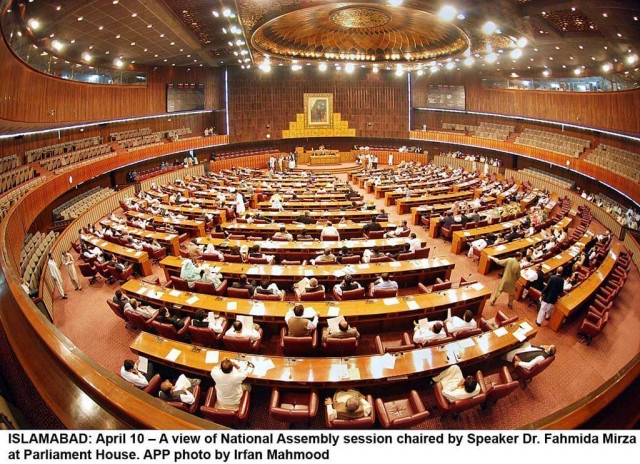Senate panel to consult parties on reducing house strength
Standing Committee on Law agrees to reduce number of seats in upper house to 100

National Assembly of Pakistan. PHOTO: APP
The proposal was firmed up in a meeting of the committee, chaired by its Chairman Javed Abbasi, to discuss the distribution of eight Senate seats from the former Federally-Administered Tribal Areas (Fata) among provinces following the merger of the region with Khyber Pakhtunkhwa.
During the deliberations, Senator Abbasi suggested that the number seats should be kept to a minimum, saying that it should not be increased like it is done in the National Assembly. “Lower the number of Senate seats, better the debate and the legislation,” he stressed.
Abbasi told the committee members that proposals for increasing the number of provinces in the country were also under consideration, so “maybe tomorrow if a new province is created, the seats will be increased”.
Senator Walid Iqbal said that India allocates three seats in its upper house to those who rendered significant services for their country. He mentioned that actor Rekha and cricketer Sachin Tendulkar had served as members of the Indian Rajya Sabha (senate).
When Abbasi asked if such seats are allocated whom he would like to nominate, Senator Iqbal replied: “You create the seats, I’ll nominate some.” Senator Mustafa Nawaz Khokhar interjected saying: “We can also give representation to the disabled and the labour.”
Khyber Pakhtunkhwa Advocate General Abdul Latif Yousafzai proposed Senate seats for Kashmir and Gilgit-Baltistan regions, arguing: “If these areas get representation in the parliament, the people from there will feel proud as Pakistanis.”
However, the law secretary stressed the need for legal justification for increasing or decreasing the number of the Senate seats. Senators Sana Jamali, Zeeshan Khanzada and Aisha Farooq argued that the number of seats in the Senate should remain unchanged.
Later, the members agree to reduce the number of seats to 100. Abbasi, however, cautioned that the committee would have to see if there were any complications in the process of conducting elections or the issue of special seats.
He also discouraged the trend of bringing in constitutional amendment bill on every issue. “This is not a good trend,” he said. “If the political parties being in too many amendment bills, it will be difficult to keep the 1973 Constitution in its original shape.”



















COMMENTS
Comments are moderated and generally will be posted if they are on-topic and not abusive.
For more information, please see our Comments FAQ